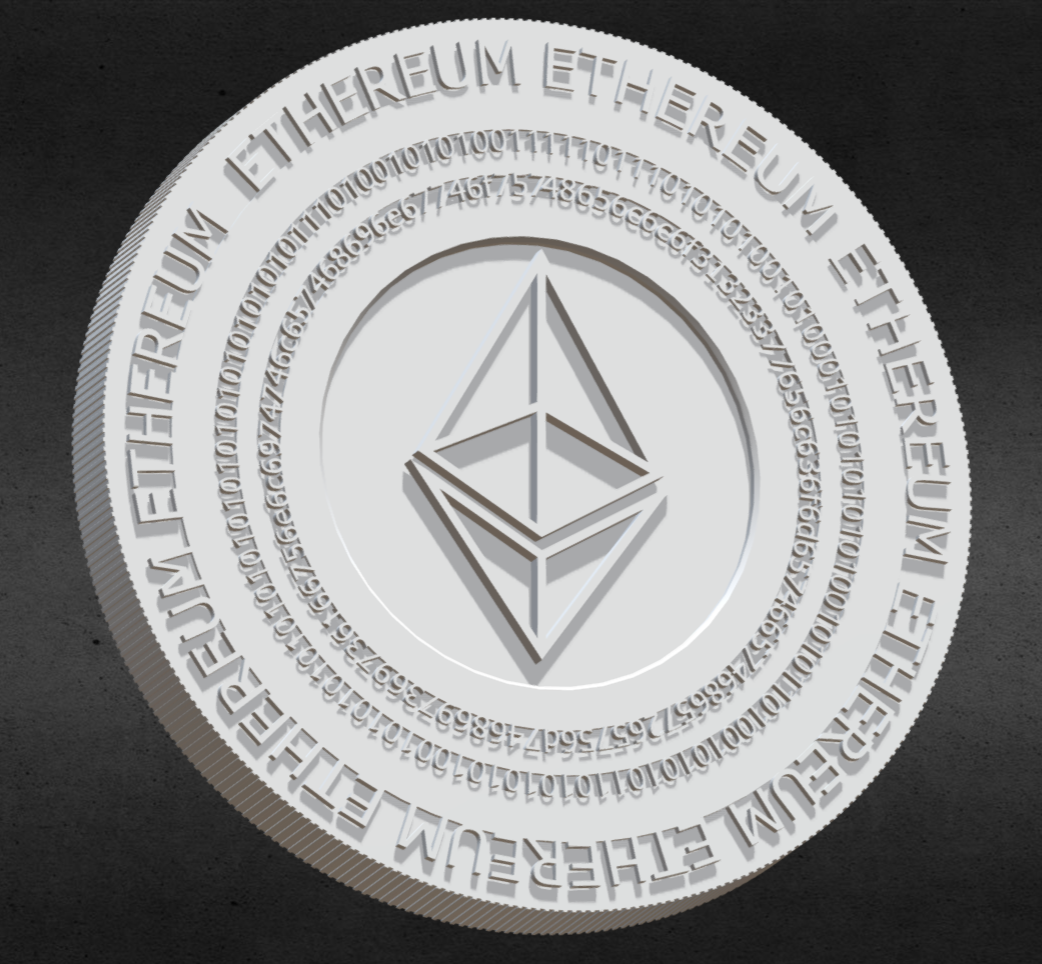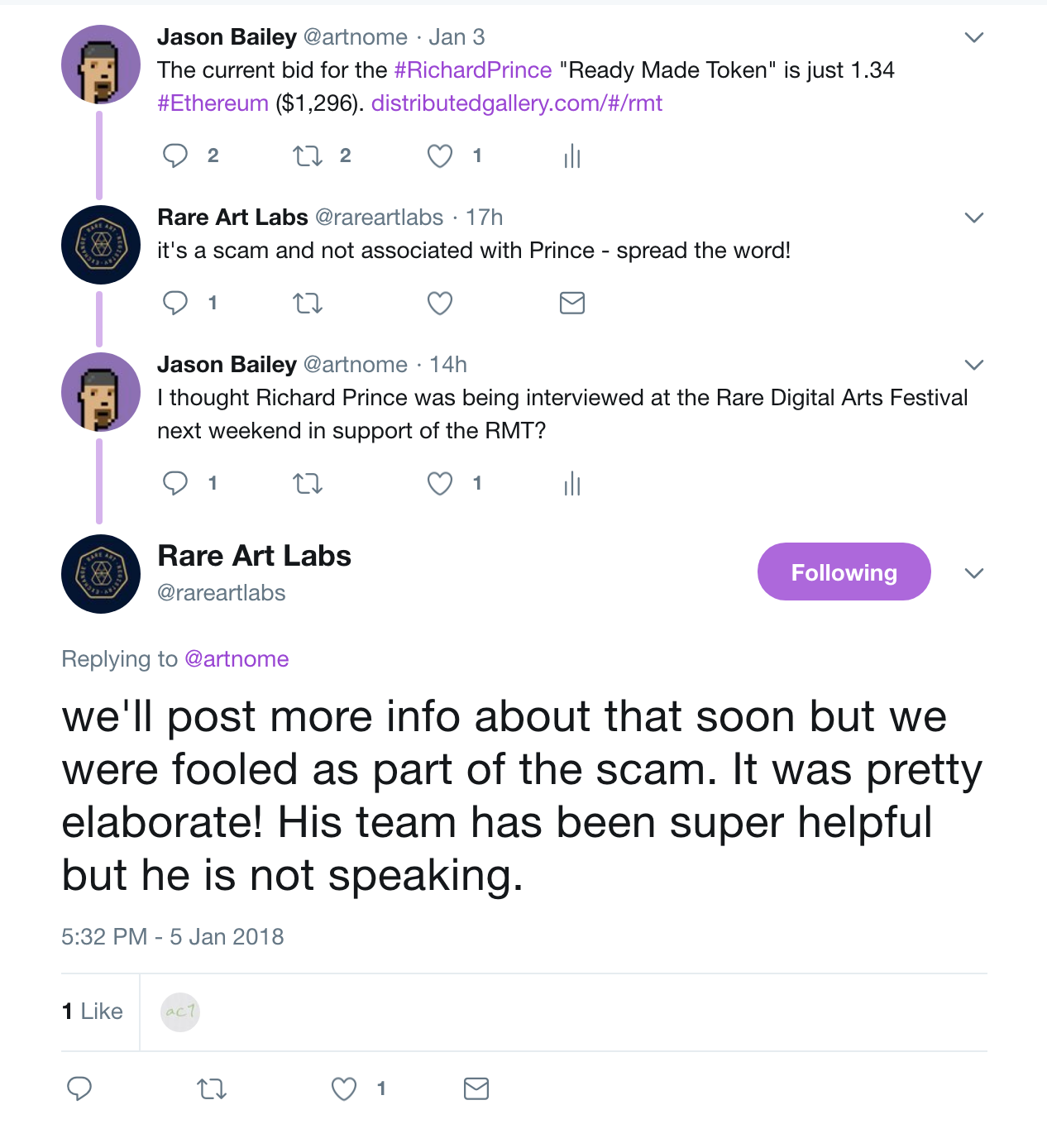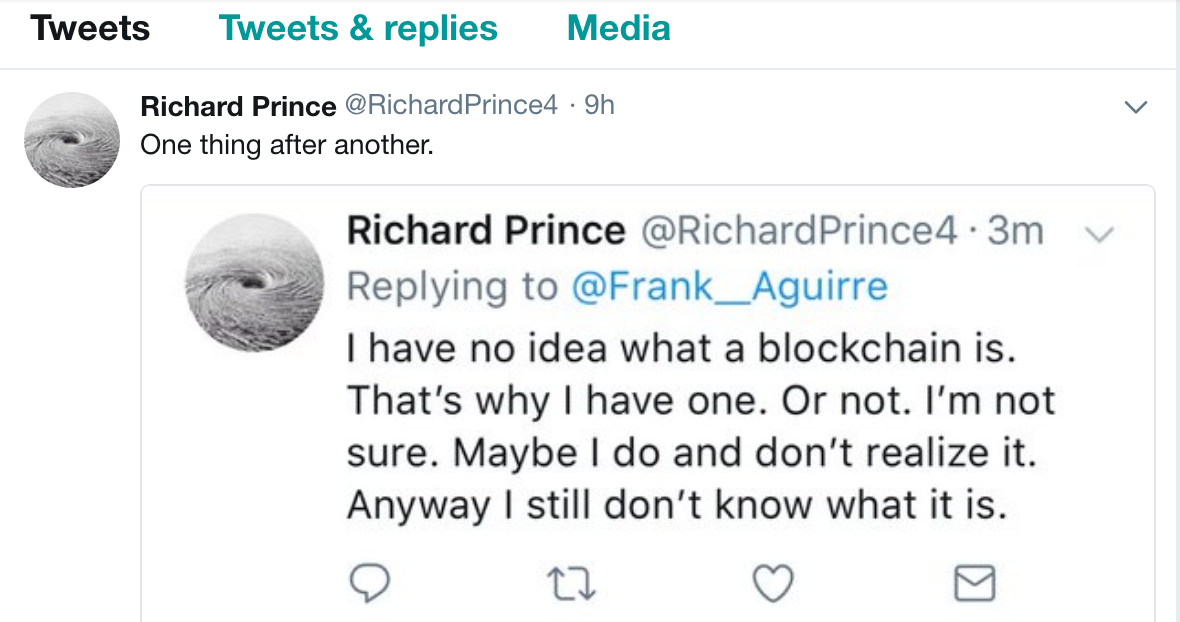In mid-December, a website called “The Distributed Gallery” announced they were auctioning a single “Ready-Made Token” by Richard Prince that consisted of a single Ethereum token. According to the site:
“The Ready-Made Token (RMT) is a blockchain-based crypto-currency, only one unit of which will ever be emitted. The purpose of Richard Prince with this project is to experiment with blockchain technologies by altering the status of crypto-currencies: from an exchange medium to an exclusive artwork. With this gesture, Richard Prince questions what money is, puts the lights on the beliefs it relies on and its links to the art market.”
I’ll be honest, it sounded like a pretty cool piece of conceptual art to me and I was ready to bid. It was even announced that Richard Prince would be interviewed at the “Rare Digital Art Festival” in NYC on January 13th (which I hope to attend). I was in the process of converting $1.3K into Ethereum to make a competitive bid when several sources associated with the “Rare Digital Art Festival” informed me it is a scam on Twitter.
Richard Prince himself weighed in from his own Twitter account with characteristically cryptic and ambiguous responses that leaned toward confirmation of the scam.
Prince also retweeted several tweets calling the Ready-Made Token a scam.
All this scuttle-butt around the scam of course made me more interested, not less. As an self-styled amateur detective in digital art fraud, I immediately went to work. Here is what I found.
The website auctioning the Richard Prince Ready-Made Token is www.distributedgallery.com. The site was still live at the time of this writing. I took screenshots in case it is taken down. A simple “WhoIs” lookup tells me that the domain name distributedgallery.com is owned by Olivier Sarrouy and was purchased December 11, 2017. The earliest stories about the Ready-Made Token started coming out just a few days after on December 18th.
Who Is Olivier Sarrouy?
@ osarrouy Twitter Profile Image
Having identified the owner of the Decentralized Gallery website, reportedly a scam in which I almost unwittingly participated, I wanted to know more about him. A quick Google search brought up a Twitter account for a Olivier Sarrouy. His last Tweet, dated December 18th, was retweet of an article about the "Richard Prince" Ready-Made Token.
Pretty good chance this is the Olivier Sarrouy we are looking for. According to the Twitter account, Olivier is a "Master of Conferences in Information and Communication Sciences at Rennes 2 University." According to his academic profile:
My research aims to analyze the economic, organizational, social and political recompositions that the hegemony of the web now exerts. Digital technologies thus constitute the place from which to think, in my works, the changes of the contemporary world.
Honestly, Olivier seems like a pretty cool guy. If I hadn't almost lost $1.4k bidding on an auction for a non-existant Richard Prince Ready-Made Token, I'd have probably gotten along with him. Olivier, I am curious to your motives and would love to chat some time, you can reach me via Twitter @artnome or at jason@artnome.com.
I had initially planned on buying the singular Richard Prince Ready-Made Token, and democratizing it by tokenizing it into thousands of smaller tokens that could be purchased for less money via an ICO. I am big fan of Marcel Duchamp, the father of the Ready-Made, and still believe Olivier's idea is quite brilliant. Honestly, I would consider buying the Ready-Made Token from Olivier even without connection to Richard Prince, but I fear my money would vaporize. For now, I am stuck trying to convert 1.3101 ETH back into dollars before I get in trouble with my wife.
UPDATE:
I have confirmed that Olivier Sarrouy is the originator of the Richard Prince Ready-Made Token and I will be publishing my full interview with him shortly. While I encourage you to read the full Interview when it becomes available as it is an interesting story, I am sharing the key points from our interview below.
- In Olivier's opinion "this project really raises a lot of important questions about what art is, about its relationships to the art world and the art market."
- The use of "Richard Prince" as the artists name was intended to play with identity, a concept they thought the famous Richard Prince would appreciate.
"To fulfill our idea - about ReadyMade, Dada, and so on - we needed a signature. So we decided to create a signature of our own : Richard Prince. Richard Prince is the name of a twitter account we hold so we told to ourselves that it would be fun to play with the homonymy and see where this would lead us. Was also find it fun to play over this kind of double identities for a dadaist project. That worked like a experimental gesture."
- The famous Richard Prince did not want to participate in their game.
- They were invited to present at the Rare Digital Art Festival. They believed it was partially based on the merit of their project, the Ready-Made Token.
- When the real Richard Prince's manager informed the Rare Digital Art Festival that it was not the famous Richard Prince presenting, they became angry.
- The real Richard Prince, The Rare Digital Art Festival, and Artnome all started spreading the word it is a scam.
- Olivier believes that being uninvited to the Rare Digital Art Festival is validation of their project.
"You know if you can call something a scam over a signature change or because you made a mistake over the signature of artwork it just says what we were trying to experiment with, that the art is just a matter of name a matter of signature. That's really fun because the project was marvelous and fabulous to them until they realized it is not the right Richard Prince."
- The nature of the blockchain is such that there is no way to completely stop the auction. It has a life of its own now.
- They have returned the money to people who bid and were disappointed to find out it was not the real Richard Prince.
- If the person who buys the Token is happy with the purchase they will use the funds for other blockchain projects. These ironically include projects to increase transparency for authors, artists, and musicians.
More to come when I finish transcribing the full interview. I have reached out to Richard Prince for comment and have not heard back. I also plan on reaching out to the creators of the Rare Digital Art Festival for comment.






